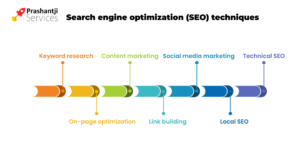What is SEO?
Search engine optimization, or SEO, is the process of optimizing a website or web page to rank higher in search engine results pages (SERPs). The goal of SEO is to increase the quantity and quality of traffic to a website by improving its visibility to search engine users.
SEO can be broken down into two main categories: on-page SEO and off-page SEO. On-page SEO refers to the elements of a web page that can be optimized, such as the content, HTML structure, and meta tags. Off-page SEO, on the other hand, refers to external factors that can affect a website’s ranking, such as backlinks and social media signals.
The benefits and importance of SEO
SEO is an essential aspect of digital marketing that can provide numerous benefits to businesses of all sizes. Here are some of the main benefits and importance of SEO:
- Increased website traffic: One of the primary benefits of SEO is increased website traffic. By optimizing your website for search engines, you can improve your website’s visibility and attract more visitors to your website. This increased traffic can lead to higher conversion rates and increased revenue.
- Higher search engine rankings: SEO can help you rank higher in search engine results pages (SERPs), making it easier for potential customers to find your website. Higher search engine rankings can also improve your brand’s visibility and credibility.
- Cost-effective marketing: Compared to other forms of digital marketing, such as paid advertising, SEO can be a cost-effective way to attract new customers. Once your website is optimized for search engines, you can continue to receive organic traffic without having to pay for expensive ads.
- Long-term benefits: SEO is not a one-time fix; it’s an ongoing process. However, the benefits of SEO can be long-lasting. By continuing to optimize your website for search engines, you can continue to attract new customers and improve your online presence.
SEO is an essential aspect of digital marketing that can provide numerous benefits to businesses of all sizes. By optimizing your website for search engines, you can increase website traffic, improve the user experience, rank higher in search engine results pages, and gain a competitive advantage over other businesses in your industry.
Types of SEO
Search engines consider many factors when ranking content, and as such there are many facets to SEO. The three core types of SEO are on-page, off-page, and technical SEO:
- On-page SEO: Optimizing the quality and structure of a web page’s content can increase its visibility in search engine results. Keywords and HTML tags are two of the main factors that affect on-page SEO.
- Off-page SEO: To optimize a page, you can get other sites to link to it and you can also include links to that page from other pages. Backlinks, internal linking, and reputation are your off-page MVPs.
- Technical SEO: Improving your site’s performance and ranking on search engines. Site security (SSL certificates), UX, and structure are key here.
Three types of SEO can be used on websites and blogs, but they also apply to three subtypes of SEO:
- Local SEO: Getting your business to rank as high as possible on Google Maps and in local search results. Reviews, listings, and optimization of your Google My Business page are most important here.
- Image SEO: A mix of on-page and technical strategies to get images on your website to appear in Google image search results.
- Video SEO: Get your videos to rank in YouTube or Google video search results with a combination of on-page, technical, and off-page strategies.
How does SEO work?
Before diving into the specifics of SEO, it’s important to understand how search engines work. Search engines use complex algorithms to crawl, index, and rank websites based on a variety of factors. When a user enters a query into a search engine, the algorithm analyzes billions of web pages to determine which ones are most relevant to the search.
Several factors can affect a website’s ranking in search engine results pages. These include:
- Content: The quality, relevance, and uniqueness of a website’s content are all important factors in search engine rankings. Pages with high-quality, relevant content are more likely to rank higher in search results.
- Keywords: Keywords are the words and phrases that people use to search for information online. By including relevant keywords in a website’s content and meta tags, it can improve its visibility in search results.
- Backlinks: Backlinks are links from other websites to a particular page on a website. The more high-quality backlinks a page has, the more likely it is to rank higher in search results.
- User experience: Search engines also take into account the user experience of a website. Sites that are easy to navigate, fast to load, and mobile-friendly are more likely to rank higher in search results.
Search engine optimization (SEO) techniques

There are many search engine optimization (SEO) techniques that businesses can use to improve their website’s search engine visibility and attract more traffic. Here are some of the most effective SEO techniques:
- Keyword research: Keyword research is an essential part of SEO. By identifying the terms and phrases that their target audience is searching for, businesses can optimize their website’s content to improve its search engine visibility.
- On-page optimization: On-page optimization involves optimizing individual web pages on a website to improve their search engine ranking. This includes optimizing factors such as page titles, meta descriptions, header tags, and content quality.
- Content marketing: Content marketing involves creating high-quality, informative, and engaging content that attracts and retains visitors to a website. This can include blog posts, videos, infographics, and other types of content.
- Link building: Link building involves getting other websites to link back to your website. High-quality backlinks can help to improve a website’s search engine ranking and increase its visibility in search engine results pages.
- Social media marketing: Social media marketing involves promoting a website or its content on social media platforms such as Facebook, Twitter, and LinkedIn. This can help to drive traffic to a website and increase its visibility in search engine results pages.
- Local SEO: Local SEO involves optimizing a website for local search queries, such as “restaurants near me” or “plumbers in New York City.” This can include optimizing local listings, creating local content, and building local backlinks.
- Technical SEO: Technical SEO involves optimizing a website’s technical elements to improve its search engine ranking. This includes optimizing website speed, ensuring that the website is mobile-friendly, and implementing schema markup to improve search engine understanding of website content.
SEO ranking factors on Google
- Content quality and relevance
- Keyword research and optimization
- Backlinks
- User experience
- Mobile-friendliness
- Page speed
- Technical SEO
Top SEO tools
There are many SEO tools available that businesses can use to improve their website’s search engine visibility and attract more traffic. Here are some of the top SEO tools:
- Google Analytics: Google Analytics is a free web analytics tool that businesses can use to track website traffic, user behavior, and other key metrics. It can help businesses to identify areas for improvement in their website’s SEO.
- Google Search Console: Google Search Console is a free tool that allows businesses to monitor their website’s search engine performance and identify issues that may be impacting their ranking in search engine results pages.
- SEMrush: SEMrush is a popular SEO tool that provides a wide range of features, including keyword research, competitor analysis, and backlink analysis. It also includes features for site auditing and optimization recommendations.
- Ahrefs: Ahrefs is a comprehensive SEO tool that provides features for keyword research, competitor analysis, backlink analysis, and content analysis. It is particularly well-regarded for its backlink analysis features.
- Moz: Moz provides a range of SEO tools, including keyword research, site auditing, and backlink analysis. It also provides a range of educational resources and community support for SEO professionals.
- Yoast SEO: Yoast SEO is a popular WordPress plugin that provides on-page optimization features, including the ability to optimize page titles, meta descriptions, and content quality.








